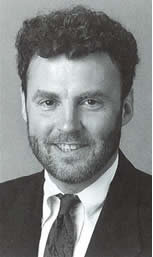1997 Metcalf Cup & Prize
Thomas Underwood, CGS
 One of Professor Thomas Underwood’s students recalls his first day at the College of General Studies: “Professor Underwood soared into the classroom and began talking to us. Within minutes, he knew our names and faces. As the hour flew by, I realized that he had memorized our academic files. As the course proceeded, he forced me to develop my own thoughts. With his help, I began to understand that I could set high educational goals and actually achieve them. Thanks to Professor Underwood, I know where I’m going.”
One of Professor Thomas Underwood’s students recalls his first day at the College of General Studies: “Professor Underwood soared into the classroom and began talking to us. Within minutes, he knew our names and faces. As the hour flew by, I realized that he had memorized our academic files. As the course proceeded, he forced me to develop my own thoughts. With his help, I began to understand that I could set high educational goals and actually achieve them. Thanks to Professor Underwood, I know where I’m going.”
With remarkable success, Professor Underwood teaches students who have not yet hit their academic strides and who are often uncertain of their ability to master a university curriculum. He offers these students the only kind of self-esteem worth having: that earned through high achievement.
“I didn’t do very well,” wrote a student about one of her first quizzes in Professor Underwood’s class, “and my first reaction was anger and frustration at what seemed an impossible test. But I have come to realize that he was trying to teach us to read carefully, and this is a lesson that I will never forget.” another writes, “Class would start by Professor Underwood making an absolutely aggravating remark about the reading, provoking us into a passionate discussion. When we faltered, he encouraged by reminding us how capable we are.”
Professor Underwood achieves a remarkable synthesis of academic rigor and personal encouragement of every student. His own account of his teaching is characteristically modest. He says only that he is “unwilling to abandon all of the methods of a good, nineteenth-century schoolteacher, emphasizing retention of essential information and the acquisition of critical reading skills.”
In Professor Underwood, however, that nineteenth-century schoolmaster takes on new guises: he is also the provocative nonconformist who dares unconventional ideas and defies conventional wisdom about how hard students will work and how much they can be expected to learn.
And he is the teacher as well as spellbinding performer, who knows how to capture and extend the attention spans of students who have grown up in the age of MTV. His classes crackle with energy and soar aloft, and only when his students are intoxicated with the pleasure of learning do they discover that they are, after all, in the hands of that nineteenth-century schoolmaster who is determined that they learn to read critically, to write ably, and to know their facts cold.
Professor Underwood, one student writes, “has been mainly responsible for transforming me and others like me from shy, nervous, insecure freshmen into outgoing, confident sophomores who feel well prepared and who look forward to facing the academic challenges of our junior and senior years at Boston University.”
In letters that are afire with the intellectual flame he has kindled, Professor Underwood’s students champion him as the teacher who taught them how to succeed. He embodies the great teaching that Dr. Metcalf set out to honor with the Metcalf Cup and Prize.
